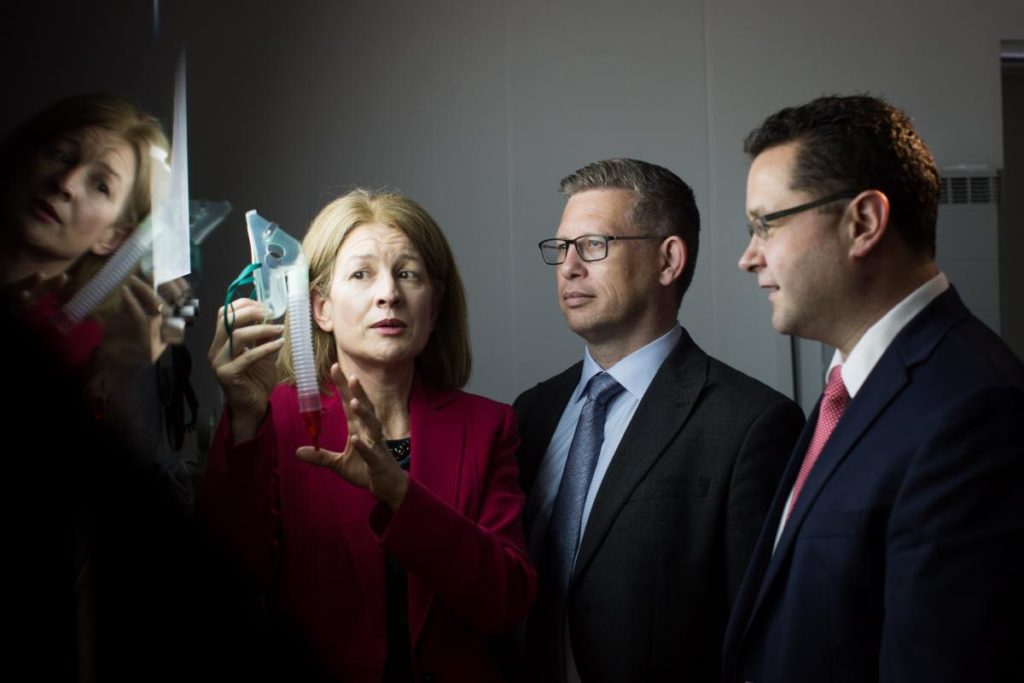A medical device for Cystic Fibrosis (CF) sufferers which lessens their exposure to infections resulting in fewer doctors’ visits, reduced antibiotic usage and shorter hospital stays, is expected to be market ready within two years.
University of Limerick (UL) inventors recently secured funding for the new percussion device that helps remove mucus from the airways and will, they hope, greatly improve the quality of life for cystic fibrosis patients.
Ireland has the highest incidence of CF in the world and CF is the most common, fatal hereditary disease in the United States.
Professor Colum Dunne, who is Foundation Chair and Director of Research at UL’s Graduate Entry Medical School (GEMS), explained the background to the development of the product.
“Patients with respiratory diseases use various devices, which help the removal of mucus from the airways and the improvement of pulmonary or lung function. One example that we have focused on here is the CF patient airway, which is defective in ciliary function; resulting, due to ineffective removal, in a mucus-rich environment favouring growth of bacteria. These bacteria include potential pathogens, associated with chronic infection, decreased lung function and accelerated respiratory disease”.
Currently, there are percussion-based chest physiotherapy devices on the market, but according to Professor Dunne, these “can sometimes become reservoirs for the bacteria that cause infections in Cystic Fibrosis patients”. Because the new device, SoloPep, is disposable, it poses no threat of reinfection.
“In our research, we have observed that compliance with hygiene practices for reusable devices, by patient, is potentially poor. As such, despite even excellent compliance with prescribed antimicrobial regimens, the devices may become colonised with problematic or opportunistic pathogenic microbes,” Professor Dunne outlined.
“The devices may, therefore, function as a reservoir that does not come into contact with the antimicrobial agents. Subsequently, re-infection may occur post-antimicrobial cessation by microbes present in the reservoir. Therefore, there is a need to develop novel inexpensive, single-use devices,” he added.
“Ireland has the highest per capita incidence of Cystic Fibrosis globally. Because of this, it is reasonable to expect treatment innovations generated by Irish researchers and carers. In this case, our studies included patient involvement from the outset and allowed us to develop something that is truly technologically disruptive. The design of this new positive expiratory pressure (PEP) device is clever and focused on the end user from the beginning. It removes significant risk for patients by improving their microbiology hygiene and safety,” Professor Dunne added.
Dr Leonard O’Sullivan from UL’s School of Design is co-principal investigator for this device.
“SoloPEP is a good example of user-centred design and it will have a dramatic impact on the quality of life of cystic fibrosis patients in a sector with significant commercial opportunity,” he said.
The Limerick-based team, which recently secured €500,000 in Enterprise Ireland funding for the development of the product, involves microbiologists, product designers and medical doctors who specialise in treating both paediatric and adult respiratory illness. The team includes Professor Deirdre McGrath (UL GEMS and Respiratory Consultant at Barrington’s Hospital) and Dr Barry Linnane (Senior Clinical Lecturer and Paediatric Consultant University Hospital Limerick).
“This product has the potential to improve the lives of Cystic Fibrosis and other patients. But for that to happen the product must actually be available to them,” Professor Dunne concluded.

(L to R) Professor Deirdre McGrath of University of Limerick’s Graduate Entry Medical School and respiratory consultant at Barrington’s Hospital, Professor Colum Dunne, Foundation Chair and Director of Research at UL GEMS and Dr Leonard O’Sullivan, senior lecturer in design ergonomics at UL and Health Research Institute (HRI) member are part of a team who recently received Enterprise Ireland funding to bring to market a new medical device for Cystic Fibrosis sufferers.